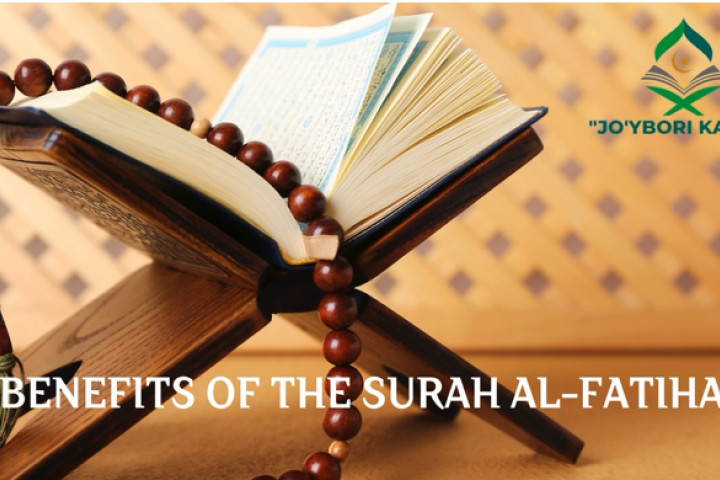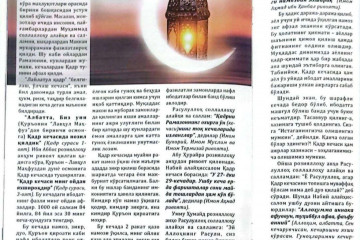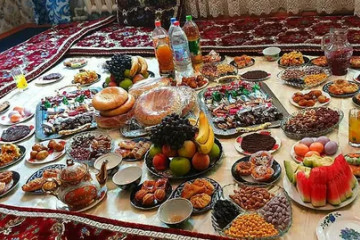
BENEFITS OF THE SURAH AL-FATIHAH
“This is the Book, in it is guidance sure, without doubt, to those who fear Allah.”
Surah al-Fatihah is one of the Qur’an’s most recited and most popular surahs. It’s also the first surah in the Qur’an and from Arabic word it means the opening or the introduction. It is the best surah of the Qur’an that introduces the whole of the Holy Qur’an. In the beginning of the Book of Tafseer, Al-Bukhari, in his Sahih, said:
“It is called Umm Al-Kitab, because the Qur’an starts with it and because the prayer is started by reciting it.” Imam Ahmad recorded that Abu Hurayrah r.a. narrated about Umm Al-Qur’an that the Prophet ﷺ said, “It is Umm Al-Qur’an, the seven repeated (verses) and the Glorious Qur’an.”
Surah al-Fatihah is not only named al-Fatihah. It has several names as narrated in the Qur’an and the sunnah of the Prophet Muhammad ﷺ. These names are related to surah al-Fatihah’s benefits in several ways. Let’s look through all other names of the surah: As-Salah (The Prayer), since Allah Almighty said in a hadith Qudsi, “I have divided the prayer between Myself and My slaves.”
Al-Hamd (Surah of Praise), because praise is mentioned in it. This is similar to the way other surahs are named, such as “The Surah of the Battlements’, or “Booty”, “Repentance” and the like.
The Fatihah (Opener) of the Book (Fatihat al-Kitab), this name is undisputed among the scholars. It is called that because it opens the recitation of the Qur’an and the writing of every copy of the Qur’an opens with it, and the prayer also opens with it.
Umm ul-Kitab (The Mother of the Book), al-Bukhari said, “It is called Umm ul-Kitab, because the Qur’an starts with it and because the prayer is started by reciting it.”
Umm ul-Qur’an (The Mother of the Qur’an), Abu Ja’far, Muhammad bin Jarir At-Tabari recorded Abu Hurayrah r.a. saying that the Messenger of Allah ﷺ said about Fatihah, “It is Umm ul-Qur’an, Al-Fatihah of the Book (the Opener of the Qur’an) and the seven repeated (verses).”
Al Saba’ Al-Mathani (The seven repeated), it is called that because it is repeated in every rak’at of the prayer.
The Immense Qur’an, it is called that because it contains all the sciences of the Qur’an.
Healing, Ad-Darimi related from Abu Sa’id al-Khudri r.a. that the Messenger of Allah ﷺ said, “The Fatihah of the Book is healing from every poison.”
Ar-Ruqyah (Remedy), in the Sahih, there is the narration of Abu Sa’id r.a. telling the story of the Companion who used Al-Fatihah as a remedy for the tribal chief who was poisoned.
Benefits of the Surah al-Fatihah
Surah al-Fatihah is the greatest surah in the Qur’an that consists of great benefits narrated by authentic hadiths. Imam Ahmad bin Hanbal recorded in the Musnad that Abu Sa’id bin Al-Mu’alla said, “I was praying when the Prophet ﷺ called me, so I did not answer him until I finished the prayer. I then went to him and he said, “What prevented you from coming?” I said, “O Messenger of Allah! I was praying. He said, “Didn’t Allah say, “O you who believe! Answer Allah (by obeying Him) and (His) Messenger when he calls you to that which gives you life.” He then said, “I will teach you the greatest Surah in the Qur’an before you leave the Masjid.” He held my hand and when he was about to leave the Masjid, I said, “O Messenger of Allah! You said: “I will teach you the greatest Surah in the Qur’an.” He said, “Yes.” “Al-Hamdu lillahi Rabbil-‘Alamin” It is the seven repeated (verses) and the Glorious Qur’an that I was given.”
Al-Bukhari, Abu Dawud, An-Nasa’i and Ibn Majah also recorded this Hadith.
Also, Imam Ahmad recorded that Abu Hurayrah r.a. said, “The Messenger of Allah ﷺ went out while Ubayy bin Ka’b r.a. was praying and said, “O Ubayy!” Ubayy did not answer him. The Prophet ﷺ said, “O Ubayy!” Ubayy prayed faster then went to the Messenger of Allah ﷺ saying, “Peace be upon you, O Messenger of Allah!”
He said, “Peace be upon you. O Ubayy, what prevented you from answering me when I called you?” He said, “O Messenger of Allah! I was praying.” He said, “Did you not read among what Allah has sent down to me, “Answer Allah (by obeying Him) and (His) Messenger when he calls you to that which gives you life.” He said, “Yes, O Messenger of Allah! I will not do it again.” The Prophet ﷺ said, “Would you like me to teach you a Surah the likes of which nothing has been revealed in the Tawrah, the Injil, the Zabur (Psalms) or the Furqan (the Qur’an)?” He said, “Yes, O Messenger of Allah!” The Messenger of Allah ﷺ said, “I hope that I will not leave through this door until you have learned it.” He (Ka’b r.a.) said, “The Messenger of Allah ﷺ held my hand while speaking to me. Meanwhile I was slowing down fearing that he might reach the door before he finished his conversation. When we came close to the door, I said: “O Messenger of Allah! What is the Surah that you have promised to teach me?” He ﷺ said, “What do you read in the prayer?” Ubayy said, “So I recited Umm ul-Qur’an to him.” He said, “By Him in Whose Hand is my soul! Allah has never revealed in the Tawrah, the Injil, the Zabur or the Furqan a Surah like it. It is the seven repeated verses that I was given.”
Also,Tirmidhi recorded this Hadith and in his narration, the Prophet ﷺ said, “It is the seven repeated verses and the Glorious Qur’an that I was given.” Also, Imam Ahmad recorded that Ibn Jabir r.a. said, “I went to the Messenger of Allah ﷺ after he had poured water (for purification) and said, “Peace be upon you, O Messenger of Allah!” He did not answer me. So I said again, “Peace be upon you, O Messenger of Allah!” Again, he did not answer me, so I said again, “Peace be upon you, O Messenger of Allah!” Still he did not answer me. The Messenger of Allah went while I was following him, until he arrived at his residence. I went to the Masjid and sat there sad and depressed. The Messenger of Allah ﷺ came out after he performed his purification and said, “Peace and Allah’s mercy be unto you, peace and Allah’s mercy be unto you, peace and Allah’s mercy be unto you.” He then said, “O Abdullah bin Jabir! Should I inform you of the best Surah in the Qur’an?” I said, “Yes, O Messenger of Allah!” He said, “Read, “All praise be to Allah, the Lord of the Existence,” until you finish it.” This Hadith has a good chain of narrators. Some scholars relied on this Hadith as evidence that some Ayat (verse) and Surahs have more virtues than others. Furthermore, in the chapter about the virtues of the Qur’an, al-Bukhari recorded that Abu Sa’id Al-Khudri r.a. said, “Once, we were on a journey when a female servant came and said, “The leader of this area has been poisoned and our people are away. Is there a healer among you?” Then a man whose healing expertise did not interest us stood for her, he read a Ruqyah for him, and he was healed. The chief gave him thirty sheep as a gift and some milk. When he came back to us we said to him, “You know of a Ruqyah, or did you do this before?” He said, “I only used Umm ul-Kitab as Ruqyah.” We said, “Do not do anything further until we ask the Messenger of Allah ﷺ.” When we went back to Madinah we mentioned what had happened to the Prophet ﷺ. The Prophet ﷺ said, “Who told him that it is a Ruqyah? Divide (the sheep) and reserve a share for me.”
Also, Muslim recorded in his Sahih, and An-Nasa’i in his Sunan that Ibn Abbas r.a. said, “While Jibrail (Gabriel) a.s. was with the Messenger of Allah ﷺ, he heard a noise from above. Jibrail a.s. lifted his sight to the sky and said, “This is a door in heaven being open, and it has never been opened before now.” An angel descended from that door and came to the Prophet ﷺ and said, “Receive the glad tidings of two lights that you have been given, which no other Prophet before you was given: the Opening of the Book and the last (three) Ayat of Surah al-Baqarah. You will not read a letter of them, but will gain its benefit.”
Muslim recorded that Abu Hurayrah r.a. said that the Prophet ﷺ said, “Whoever performs any prayer in which he did not read Umm ul-Qur’an, then his prayer is incomplete.” He said it thrice. Abu Hurayrah r.a. was asked, “When we stand behind the Imam he said, “Read it to yourself, for I heard the Messenger of Allah ﷺ say, “Allah, the Exalted, said: “I have divided the prayer (al-Fatihah) into two halves between Myself and My servant, and My servant shall have what he asks for. “If he says, “All praise and thanks be to Allah, the Lord of existence.”
Allah says, “My servant has praised Me.”
When the servant says, “The Most Gracious, the Most Merciful”
Allah says, “My servant has glorified Me.”
When he says, “The Owner of the Day of Recompense.”
Allah says, “My servant has glorified Me,” or “My servant has related all matters to Me.”
When he says, “You (alone) we worship, and You (alone) we ask for help.”
Allah says, “This is between Me and My servant, and My servant shall acquire what he sought.”
When he says, “Guide us to the straight path. The way of those on whom You have granted Your grace, not (the way) of those who earned Your anger, nor of those who went astray.”
Allah says, “This is for My servant, and My servant shall acquire what he asked for.”
The surah Fatihah is also dua for us. As we know Allah subhana ta’ala taught us this perfect dua – surah Fatihah – because of His endless mercy. As human being we continuously commit sins and make some mistakes during our lifetime, so we need Allah’s guidance. By guidance, Allah helps His servants to obey Him and to stop sinning. For this reason the surah Fatihah is one of the most powerful supplications. Muslims recite it in their daily prayers asking Allah for the straight path, the path of those who have received His grace, not the path of those who have gone astray. Surah Fatihah is also seen as a means of protection from evil forces. Muslims often recite it as a form of spiritual shield against negative influences. Its verses are believed to create a protective barrier around the reciter, guarding them from harm.
To sum up, the surah Fatihah directs the believers to invoke Allah to guide them to the straight path, which is the true religion, and to help them remain on that proper path in this life. The surah Fatihah also encourages Muslims performing good deeds, so that the believers will be in the company of the good-doers on the Day of Resurrection. The surah also warns against following the paths of misguidance, so that one does not end up being gathered with those who indulge in sin, on the Day of Resurrection, including those who have earned the anger and those who were led astray.
“Joybori Kalon” women’s secondary specialized Islamic college
Shomurodova Mukhayo Fayzullayevna
 УЗ
УЗ
 РУ
РУ
 EN
EN
 العربية
العربية






Izoh qoldirish